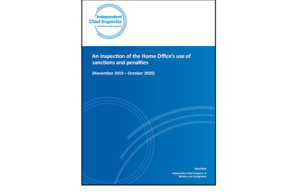Inspection Report Published: An inspection of the Home Office’s use of sanctions and penalties
This inspection examined the efficiency and effectiveness of the Home Office’s use of sanctions and penalties, specifically those measures designed to encourage compliance with the Immigration Rules.

Publishing the report, David Bolt said:
The Home Office is able to make use of a range of sanctions and penalties to encourage and enforce compliance with the Immigration Rules. Some of these are directly within its control, while others are “owned” and administered by other government departments, agencies or third parties with input from the Home Office in the form of data, typically about individuals who do not have right to enter or remain in the UK or whose rights, for example the right to work, are restricted.
This inspection examined how efficiently and effectively the Home Office used these sanctions and penalties, which included looking at what it was seeking to achieve with each and to what extent it was succeeding.
Border Force, Immigration Enforcement and UK Visas and Immigration all use sanctions and penalties. The inspection found that current measures have been introduced piecemeal, with little evidence of consistency or coherence in their design or in their application, and no overall strategy or underpinning rationale, beyond a broad understanding that their primary purpose is to encourage compliance rather than simply to punish breaches of the Rules.
In approaching this inspection, inspectors looked beyond the Home Office for examples of best practice in the design and use of sanctions and penalties. Though now dated (it was published in November 2006), Professor Richard Macrory’s paper on ‘Regulatory Justice: Making Sanctions Effective’, produced for the Cabinet Office, offered the most comprehensive and relevant thinking on the subject.
Measured against Macrory’s “principles” and “characteristics”, the Borders, Immigration and Citizenship System (BICS) sanctions and penalties and how they are administered fell short on several counts, most notably their failure to “measure outcomes not just outputs”, to “justify their choice of enforcement actions year on year to stakeholders, Ministers and Parliament”, and to “be responsive and consider what is appropriate for the particular offender and regulatory issue”. Some were closer to the Macrory “tests” than others, but I concluded that all of the sanctions and penalties would benefit from thorough review and evaluation.
My inspection report contained two recommendations. It was sent to the Home Secretary on 21 October 2020, by which time the Home Office had committed to “a full review and evaluation of the hostile/compliant environment policy and measures – individually and cumulatively”, as recommended by Wendy Williams in her ‘Windrush Lessons Learned Review’ (WLLR).
Given the range of parties affected, and the Home Office and other resources involved in the administration of BICS sanctions and penalties, I suggested that this exercise should be extended to cover all sanctions and penalties with the aim of ensuring that each is proportionate, necessary and well-managed and that together they form a coherent whole.
The department’s partial acceptance of this recommendation, in reality is a rejection to commit “at this stage” to a wider review. From experience, if the department fails to seize the moment things are quickly forgotten as new priorities take the attention. I therefore doubt that a wider review will ever be completed.
My second recommendation concerned the need to improve record keeping and data collection and analysis. This has been a regular theme of inspections throughout my six years as Independent Chief Inspector and is true of all areas of BICS. In accepting this recommendation, the Home Office has referred to a baselining exercise to identify the key indicators against which it can measure the impact of the compliant environment, which it will complete by July 2021.
For many this will seem to be a case of too little, and much too late. From ICIBI’s perspective, in 2016, and again in 2018 and 2019, a series of inspection reports recommended that the Home Office should monitor and evaluate the impact of the hostile/compliant environment. These recommendations were only “partially accepted” and never implemented. Had they been, some of the harms suffered by the Windrush generation and others may have been avoided.
David Bolt
Independent Chief Inspector of Borders and Immigration